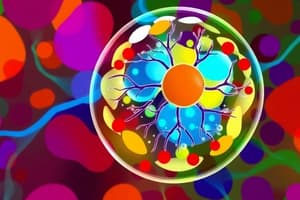Podcast
Questions and Answers
What is the primary source of energy for cellular work?
What is the primary source of energy for cellular work?
- FADH2
- Glucose
- ATP (correct)
- NAD+
Which type of cells lack nuclei and other membrane-bound organelles?
Which type of cells lack nuclei and other membrane-bound organelles?
- Eukaryotic cells
- Animal cells
- Plant cells
- Prokaryotic cells (correct)
Where do most cellular activities occur within a cell?
Where do most cellular activities occur within a cell?
- Nucleus
- Extracellular matrix
- Chloroplasts
- Cytoplasm (correct)
What process involves glucose breakdown in cellular respiration?
What process involves glucose breakdown in cellular respiration?
Which organelle is responsible for photosynthesis in plant cells?
Which organelle is responsible for photosynthesis in plant cells?
Which organelle is responsible for producing ATP through cellular respiration?
Which organelle is responsible for producing ATP through cellular respiration?
What type of transport requires energy input, often from ATP?
What type of transport requires energy input, often from ATP?
How do transport proteins function in cell membranes?
How do transport proteins function in cell membranes?
What is the primary function of muscle cells in the body?
What is the primary function of muscle cells in the body?
Which process involves carrier proteins moving substances against concentration gradients?
Which process involves carrier proteins moving substances against concentration gradients?
Study Notes
Understanding the Basics of Cell Biology: An Overview of Key Concepts
Cell biology is the study of various processes within individual cells, including their structure, functioning, interactions, and reproduction. It encompasses a broad range of topics, from cell structure and organization to cellular processes like cellular respiration, transporters, and mitochondrial dynamics. Here's a brief overview of some key concepts related to cell biology:
Cell Structure
Cells are the fundamental unit of life. They have a distinct shape, size, and purpose, and they come in different shapes depending on their type. Animal cells typically contain a nucleus, which holds genetic material, while plant cells have chloroplasts for photosynthesis. Prokaryotic cells, found in bacteria and archaeans, lack nuclei and other membrane-bound organelles.
Eukaryotic cells are divided into several regions: the nucleus containing chromatin and the nucleolus; cytoplasm, where most cellular activities occur; and extracellular matrix, which provides support and anchoring to adjacent cells.
Cellular Respiration
This is a set of metabolic reactions that transfer energy from food molecules to ATP (adenosine triphosphate), the primary source of energy for cellular work. There are three stages of cellular respiration: glycolysis (involving glucose breakdown); the citric acid cycle (where NAD+ is oxidized to NADH+); and electron transport chain (ATP generation from NADH+ and FADH2).
Cell Transport System
Cells move materials across their membranes using specialized structures called transport proteins. These proteins act as channels for specific substances, allowing them to enter or exit the cell. Passive transport includes simple diffusion, facilitated diffusion, and osmosis. Active transport requires energy input, often from ATP, and involves carrier proteins moving substances against concentration gradients.
Mitochondria
These are organelles responsible for producing ATP through cellular respiration. They also regulate calcium homeostasis, initiate programmed cell death, and play roles in apoptosis. Each cell contains hundreds to thousands of mitochondria.
Cell Functions
Cells perform numerous essential functions, such as growth, maintenance, division, defense, response to stimuli, and cell death. Some cells are specialized for specific tasks, like muscle cells contracting, nerve cells transmitting signals, and immune cells fighting infection. All these functions contribute to maintaining the overall health and functionality of multicellular organisms.
Studying That Suits You
Use AI to generate personalized quizzes and flashcards to suit your learning preferences.
Description
Test your understanding of cell biology concepts like cell structure, cellular respiration, cell transport systems, and the functions of mitochondria. This quiz covers fundamental topics in cell biology to help reinforce your knowledge and comprehension.




